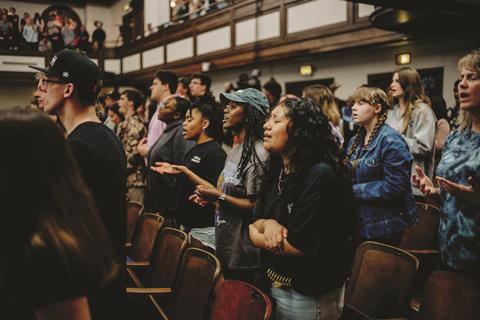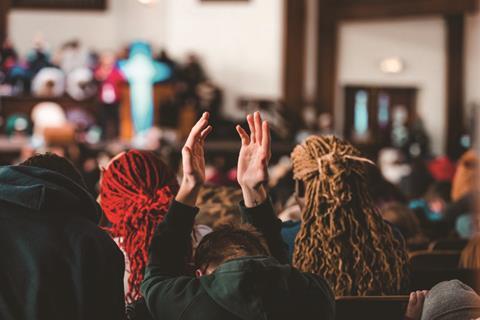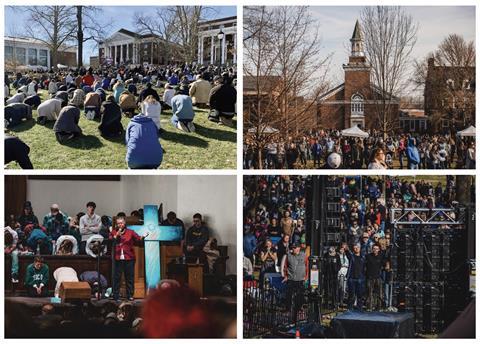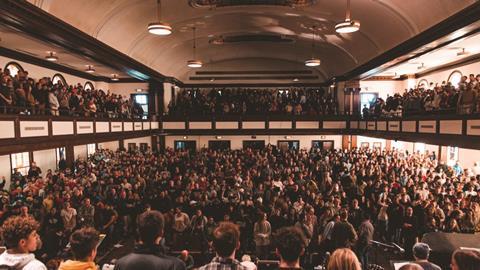It’s one year since an outpouring of the Holy Spirit in Kentucky caught the world’s attention. Many church leaders from around the world travelled to Asbury University and ‘natural sceptic’ Al Gordon was among them. He tells the story of what God did, how it changed his life and why he believes revival is not just possible, but imperative
On 8 February 2023, a university chapel service in Asbury, Kentucky, closed with a simple prayer: “Jesus, do a new thing in our midst, revive us by your love.” The meeting appeared to end unremarkably. Most of the few hundred students who had attended the mandatory service drifted back to their dorms and classrooms. But 19 young people remained, continuing to pray. They lingered, waiting and worshipping. And then heaven seemed to break open. Over the course of the next hour, the vast space of the Hughes Auditorium became infused with a deep, tangible sense of the presence of God.
Spontaneously, students across the campus began to leave their classrooms and flock to the chapel. Word spread fast. At first it was a trickle, then a great flood. Gen Z, characterised as the least religious generation in history, came running: the cynical seemingly hungry for the real thing. Within hours, the hall was full of tear-stained faces, gently meeting with Jesus. No celebrity Christians holding court, no marketing or manipulation. Just broken-hearted young people, ravaged by the pandemic and disillusioned by culture wars and toxic church, falling into the arms of Jesus. Kids pulled their mattresses into the sanctuary and slept on the floor. Day and night, night and day, time seemed to stand still. The old altar rail at the front was flooded with students repenting, reconciling, committing to follow Christ. Faculty academics became pastors, watching in awe as a great wave of reviving love broke unexpectedly on their students.
It felt like what church is meant to be, and what heaven one day will be
Over the next sweet 16 days and nights, Asbury became a thin place. More than 70,000 people turned up in person, crowding the neat picket-fenced lawns, overflowing to neighbouring chapels and halls. They queued day and night: the curious, the cynical, the hungry, the hopeful. TikTok blew up, as hundreds of thousands of young people joined vicariously through their smartphones. News crews broadcasted testimonies from the car park, and the New York Times declared it the “first great religious revival of the 21st century”.
In the end, the local authority had to shut the town, with emergency road signs flashing: ‘Revival Over Capacity’. But in all honesty what had started at Asbury could not be contained, because for those young people nothing will ever be the same. Gen Z has tasted that there is more. One of the students closed the final meeting with: “I welcome you to the rest of your life abiding in Christ.”
I’m a natural sceptic. I’m not prone to jumping on planes or chasing rumours of revival. But the name ‘Asbury’ caught my attention: I had visited Asbury in the mid-2000s to help with an Alpha Conference. It’s not the sort of flashy place you’d expect revival to break out. Picture a tiny college town with gentle lawns, one coffee shop and a grocery store. There’s a vibrant seminary in the town, and I’d remained connected with friends who live there. These people are sensible academic types, not prone to religious mania. So when I heard rumours of an outpouring, I was intrigued.
A few days later, I found myself parking my airport hire car opposite the Hughes Auditorium. I stepped out of the vehicle, closed the door and paused, arrested on the tarmac. There was a weight in the air. I could feel it. The manifest presence of God was no longer a theory: I was met with an overwhelming sense that I had to get right with Jesus. The fear of the Lord. Before I stepped into the chapel, I was crying out in repentance, confessing my pride, humbling myself before God.
Walking into the meeting space felt both reassuringly familiar, and mildly underwhelming. The same songs we all sing on a Sunday, the slightly ropey PA, no slick production or song words. The students who largely led the meeting were unpolished. There were brilliantly awkward silences. But the longer I lingered, the more I experienced the weight of glory. Hours spent worshipping felt like minutes. There was a depth and clarity to the presence of God that is hard to describe with words. A simple gospel message, the reading of scripture and, all around me, people surrendering their lives, running to the cross in repentance.
It felt like standing in a furnace of holy love, and yet we were not consumed. This was not for the polished pundit and the priestly professional. It was for the hungry, the broken, the empty vessels. This was for the desperate. I was reminded of when Jesus healed the man lowered through the ceiling by his friends. It was messy, but it was the real deal.
Yet there was also an ease to proceedings. One student put it like this: “We recognise that this is not because this is some super-spiritual environment, but the Spirit has descended on us just because he wanted to.” There was a sense of joyful wonder, a lightness to the outpouring; it felt like what church is meant to be, and what heaven one day will be.
I wept all the way home on the plane across the Atlantic: “Lord, don’t pass us by.” Naively, I wrote a to-do list of all the things we need to do differently. Graciously, I felt the Holy Spirit whisper: “Change nothing but your heart.” For months I wasn’t able to speak about what I’d experienced of Jesus without breaking down in tears. I still weep as I write this one year on.

Changed by Jesus
What’s happened in the year since Asbury? In the months that followed, our little church community back in London has experienced a season of gentle outpouring. The lower we learn to go, the more the presence of Jesus seems to grow in our midst. We’re learning so much. We’re hearing so many wonderful stories of Jesus at work. We’re normalising a new way of doing church: patiently lingering in worship times, holding space for the deep work of repentance, the reconciliation of broken relationships.
Then there’s the fruit: people are falling into the kingdom. Among the hundreds of people we’ve seen make commitments to follow Jesus since Asbury, it’s the brokenness of the young that’s most moving. I think of the 20-something cocaine addict powerfully delivered from his addiction, or the young medic who stumbled into church, experienced the presence of God and was radically set free from porn and pills.
What if an outpouring like this were to visit us tomorrow? Would we be ready?
Much of what we’re learning is unglamorous, unseen and hidden: the turning of the backstage ‘green rooms’ into ‘consecration rooms’, the commitment to lead differently, the deep relational work. The awkward learning to contend in prayer. And above all, it’s the gentle falling in love with Jesus again in the secret space of our private prayers.
And then there’s the emergence of a new kind of unity: we’ve reached across the fences to pray with a couple of other churches in our city. These joint prayer gatherings have been so special, with hundreds of mostly young people praying through the night, crying out for revival. You could light the air with a match. We’ve committed to keep going until we see an awakening in our city. While the headlines report division, decline and doom, there is another story playing out: a deep spiritual openness and hunger, especially among unchurched young people.
Idols falling
Stepping back, it’s clear that Asbury felt like a glimpse of a new operating system, one finely tuned by heaven to connect with the hearts of the emerging Gen Z and Gen Alpha. The key features? Perhaps a move away from churches built on the paradigm of worldly power to an emphasis on holy presence. Prioritising reconciling relationships over impressive personalities. Leaders who learn to seek his face before we see his hand at work. A return to simple, personal holiness and a commitment to be with the broken-hearted. A stubbornness to hold God to his promises, that he might rend the heavens and come down.
Perhaps we shouldn’t be surprised that we’re seeing a wholesale toppling of the idols that the contemporary Church has been so easily impressed and obsessed with: celebrity, platform, influence and hierarchy. A gentle reformation is underway that moves us away from the priesthood of the pastor, back to the priesthood of all believers. Simplicity, authenticity and the emergence of hope over hype. Proximity over production. And everywhere we look, we see signs of the presence of God flooding into the gap that is created when people go low, humble themselves and make room.

Get ready
Looking around today, this moment feels like a season of preparation. The conversation I’m having almost daily with young leaders is this: what if an outpouring like this were to visit us tomorrow? Would we be ready? And how can we position ourselves and our communities for revival?
Three themes seem to emerge.
Firstly, the call to consecration. As the psalmist writes, those who would ascend the hill of the Lord must come with “clean hands” and “pure heart[s]” (Psalm 24:4). This call to holiness, not earned but received, is at the heart of personal renewal and the hallmark of every move of God. And preparing the way for the Lord, as John the Baptist knew, involves going low in repentance and walking in forgiveness. Radical humility is the conduit through which the river of glory flows.
Secondly, the call to contending prayer. There is a posture of desperate urgency that contends in prayer until the Lord comes. It’s this golden thread that seems to flow through the prayers of the ordinary saints that underpin every great move of God. A deep crying out, a groaning for God to move. Preparing the way for the Lord will mean urgently recovering this awakening cry.
Thirdly, the call to communion. Spiritual and relational communion with Jesus, and each other. It’s imperative that we resolve our relational pain. Unresolved conflict lingering in leadership teams must be reconciled. We must do the hard work of coming to the cross together, loving well, forgiving freely. Right relationships are the underpinning that hold the weight of glory. This work is unavoidable in preparing for revival.

Revival is needed
Church history is the history of revival. Consider Britain in the 18th century, drunk on gin, facing grisly secular revolution that was sweeping the continent. Church attendance dwindling to a remnant. And then the fires of the great awakening were lit by Wesley, Whitefield and many others, shaping the spiritual character of the nation for generations to come. Consider Africa over the past century: 100 years ago, one in ten Africans followed Jesus; now it’s one in two. Or the Welsh Revival that swept the valleys. We still sing ‘Bread of heaven’ in sports stadiums today. Then there’s the outpouring that began at Azusa Street in 1906, where fire from heaven fell on a small store-front church in a poor neighbourhood. Black and white, young and old, rich and poor uniting in travailing prayer that sparked the Pentecostal movement that today is a billion people strong. Or the Lewis Revival that began in the 1940s in the Outer Hebrides, where the whole community was described as being “saturated with God”.
The outpouring at Asbury has woken us up to the reality that revival is not just possible in our time, it’s actually imperative for the Church in this generation. We urgently need, to quote Jonathan Edwards: “the intensification and acceleration of the normal work of the Holy Spirit”. There’s not really a Plan B: an awakening is the only viable strategy. As Habakkuk prays: “Lord, I have heard of your fame; I stand in awe of your deeds, Lord. Repeat them in our day, in our time make them known; in wrath remember mercy” (Habbakkuk 3:2).
God is closer than we think and more ready to move than our faith would often allow for. The ceiling is thinner than our eyes can see, and at some point it’s going to break open. So now is the time to pray, get right, get low, to return with all our hearts and cry out to God. Because, unlike Vegas, what happened at Asbury hasn’t stayed at Asbury. This outpouring is only just beginning…



































2 Readers' comments